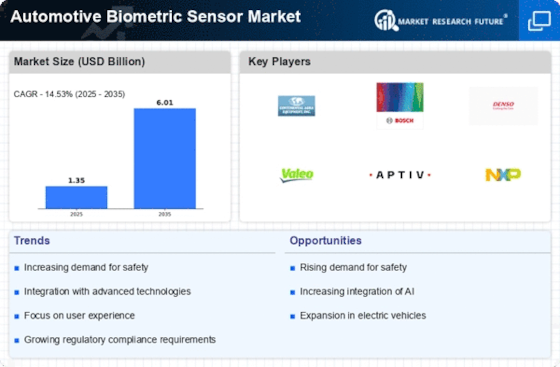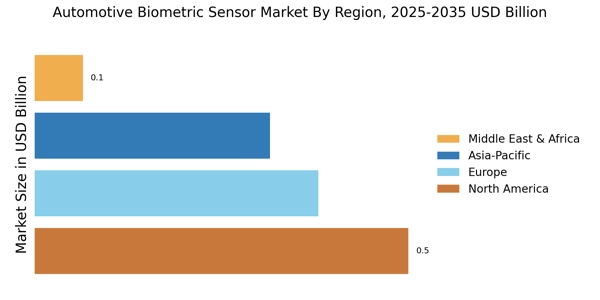Rising Demand for Enhanced Safety Features
The Automotive Biometric Sensor Market is experiencing a notable surge in demand for enhanced safety features within vehicles. As consumers become increasingly aware of safety concerns, manufacturers are integrating biometric sensors to monitor driver health and behavior. This trend is reflected in the projected growth of the market, which is expected to reach USD 2.5 billion by 2026. Biometric sensors, such as fingerprint and facial recognition systems, provide an additional layer of security, ensuring that only authorized users can operate the vehicle. This heightened focus on safety not only appeals to consumers but also aligns with manufacturers' goals to reduce liability and enhance brand reputation. Consequently, the integration of biometric technology is becoming a standard feature in modern vehicles, driving the Automotive Biometric Sensor Market forward.
Increased Investment in Automotive Technology
The Automotive Biometric Sensor Market is benefiting from increased investment in automotive technology. As automakers seek to enhance vehicle functionality and user experience, there is a growing focus on integrating biometric sensors into their designs. This investment is reflected in the rising number of partnerships between automotive manufacturers and technology firms, aimed at developing advanced biometric solutions. The market is projected to witness substantial growth, with investments expected to exceed USD 1 billion by 2025. This influx of capital is facilitating research and development efforts, leading to the creation of more innovative and efficient biometric systems. As a result, the Automotive Biometric Sensor Market is poised for significant advancements, driven by the collaborative efforts of various stakeholders.
Growing Consumer Awareness of Health Monitoring
Consumer awareness regarding health monitoring is significantly influencing the Automotive Biometric Sensor Market. As individuals become more health-conscious, the demand for vehicles equipped with biometric sensors that can monitor vital signs, such as heart rate and stress levels, is on the rise. This trend is particularly relevant in the context of long-distance driving, where fatigue and health issues can pose serious risks. The market is anticipated to expand as manufacturers recognize the potential for integrating health monitoring features into their vehicles. By providing real-time health data, these sensors not only enhance driver safety but also promote a more personalized driving experience. This growing emphasis on health monitoring is likely to drive innovation and investment in the Automotive Biometric Sensor Market.
Technological Advancements in Sensor Technology
Technological advancements are playing a pivotal role in shaping the Automotive Biometric Sensor Market. Innovations in sensor technology, such as improved accuracy and faster processing capabilities, are enabling the development of more sophisticated biometric systems. For instance, the introduction of advanced algorithms for facial recognition and heart rate monitoring is enhancing the functionality of these sensors. The market is projected to grow at a compound annual growth rate (CAGR) of 15% over the next five years, driven by these technological improvements. As manufacturers strive to differentiate their products, the incorporation of cutting-edge biometric sensors is becoming increasingly prevalent. This trend not only enhances user experience but also contributes to the overall safety and security of vehicles, thereby propelling the Automotive Biometric Sensor Market.
Regulatory Pressures for Enhanced Security Measures
Regulatory pressures are increasingly shaping the Automotive Biometric Sensor Market. Governments and regulatory bodies are implementing stringent security measures to ensure the safety of vehicles and their occupants. This has led to a growing requirement for biometric systems that can authenticate drivers and monitor their behavior. As regulations evolve, manufacturers are compelled to adopt biometric technologies to comply with these standards. The market is expected to grow as companies invest in developing solutions that meet regulatory requirements while enhancing user safety. This trend not only drives innovation but also positions the Automotive Biometric Sensor Market as a critical component in the broader automotive landscape, where security and compliance are paramount.
















